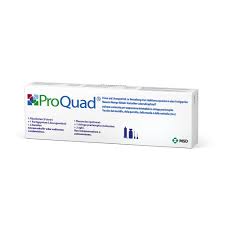
| ProQuad® |
 | Image may differ from actual product |
| The Business: | |
| Manufacturer: | Merck & Co., Inc. |
| Merck & Co., Inc.'s total sales 2018: | $42.3 billion. Reference: Facts about Merck |
| Merck & Co., Inc.'s vaccine sales 2018: | $6.8 billion. Reference: 2018 Annual Report p 124 |
| ProQuad®'s global sales in 2018: | $1,798 million (Includes ProQuad/M-M-R II/Varivax). Reference: 2018 Annual Report p 1 |
| British Columbia Center for Disease Control expense, F/Y 2018/19 for ProQuad® | $2,848,979 (incl Priorix-tetra & ProQuad) Reference: BCCDC FOIA request by TMOV, 12-06-19 |
| The Product: | |
| Description of Vaccine: | Measles, Mumps, Rubella and Varicella Virus Vaccine Live |
| Active Immunizing Agent Against Measles, Mumps, Rubella and Varicella | |
| Type of vaccine: | MMRV. Given by Intramuscular injection |
| Primary medical reference: | Package insert for Canada |
| Ingredient (follow link to independent info) | Quantity | Units | Reference |
| Rubella virus- (produced in WI-38 human diploid lung fibroblasts) | not less than 3.00 log10 | TCID50 | Package insert, p 21 |
| Oka/Merck varicella virus- (produced in human diploid cells (MRC-5)) | a minimum of 3.99 log10 | PFU | Package insert, p 20 |
| Components of MRC-5 cells including DNA and protein. | residual | Package insert, p 20 |
| CDC Vaccine Type | MEASLES, MUMPS, RUBELLA, AND VARICELLA VACCINE (PROQUAD) |
| Serious adverse events, USA, during 2018 (Definition of serious: Note 1, Source: Note 2) | 76 |
| Number of injury awards paid by VICP (USA) for this vaccine type from 1988 until September 1, 2019 (Note 3) | 21 |
| Serious adverse events following immunization, Canada, during 2018, for the group [MMR, MMRV, Var] which includes this type of vaccine. (Note 4) | 94 (Includes MMR, MMRV, Var) |
| Ingredient | Quantity | Units | Notes |
| measles virus | not less than 3.00 log10 | TCID50 | TCID50 = 50% tissue culture infectious dose |
| mumps virus | not less than 4.30 log10 | TCID50 | |
| sucrose | no more than 20 | mg | |
| Hydrolyzed gelatin | 11 | mg | |
| urea | 2.5 | mg | |
| sodium chloride | 2.3 | mg | |
| sorbitol | 16 | mg | |
| monosodium L-glutamate | 0.38 | mg | |
| sodium phosphate | 1.4 | mg | |
| Recombinant human albumin | 0.25 | mg | |
| sodium bicarbonate | 0.13 | mg | |
| potassium phosphate | 94 | mcg | |
| potassium chloride | 58 | mcg | |
| Neomycin | 5 | mcg | |
| bovine serum albumin | 0.5 | mcg | |
| other buffer and media ingredients | not shown | ||
| adventitious agents | absent | The cells, virus pools, bovine serum, and recombinant human albumin used in manufacturing of ProQuad® are all screened to ensure the absence of adventitious agents. |
Notes:
Note 1- USA - Definition of serious adverse events: According to the CDC's Vaccine Adverse Events Reporting System (VAERS), events are classified as serious when any of the following outcomes are associated with the event: Death, Permanent Disability, Life Threatening, Hospitalized, Existing Hospitalization Prolonged, Congenital Anomaly or Birth Defect.
Note 2- United States Department of Health and Human Services (DHHS), Public Health Service (PHS), Centers for Disease Control (CDC) / Food and Drug Administration (FDA), Vaccine Adverse Event Reporting System (VAERS) 1990 - last month, CDC WONDER On-line Database. Accessed at http://wonder.cdc.gov/vaers.html on Sep 28, 2019 1:51:20 AM. A most user-friendly interface for you to access the VAERS database is here. It is presented by the National Vaccine Information Center and is called MedAlerts.
Note 3- VICP is the National Vaccine Injury Compensation Program, Monthly Statistics Report
Note 4- Canada - Definition of serious Adverse Events Following Immunization are those which are life-threatening, result in hospitalization or a prolongation of hospitalization, result in persistent or significant disability, or where the outcome is a birth defect or death, as defined by the World Health Organization. Source: Adverse Events Following Immunization (AEFI) Bi-annual Report from July 1 to December 31, 2018. and Adverse Events Following Immunization (AEFI) Bi-annual Report from January 1 to June 30, 2018.